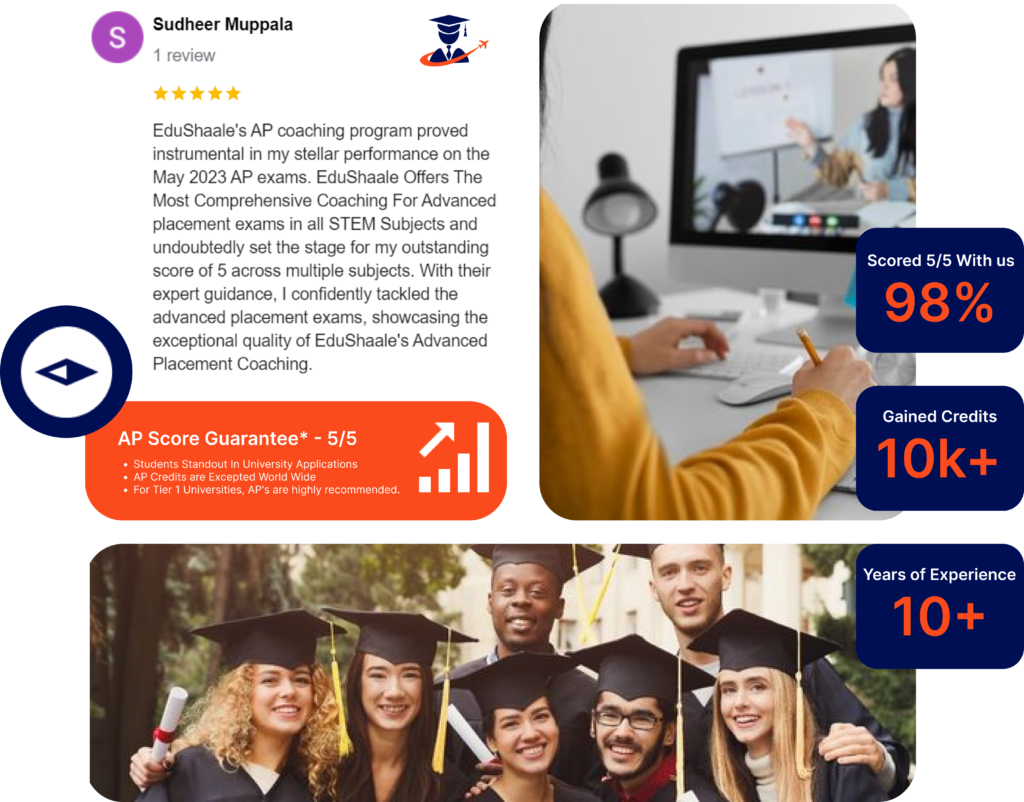AP Psychology Classes & Training Online
Are you Looking for the AP Psychology? Worry not, EduShaale has got your back
- No credit card required
- Free Demo Session
- Personalized 1-1 Classes
- Flexibile & Affordable


AP Coaching Program
- 1-1 coaching from Certified AP Trainers per subject
- 5000+ Practice Questions and Drills
- 1000+ Question Bank
- 5+ AP Style Mock Tests
- 50+ Topic Based Tests(On Demand Generation)
- 10+ years AP Past Exam Questions
- 20K+ Trusted AP Aspirants
- Parent Connect, Progress Tracking & Regular Follow-up
- 4.9/5 Rated by AP Aspirants
A high AP score not only allows you to reduce your overall tuition fee and save time, but it also increases your chances of entrance into your dream and even allows you to be considered for scholarships.
AP Psychology Structure
100 questions 1hr 10mins 67% of Score
You’ll be asked to:
- Define, describe, and explain content from a range of course topics
- Apply skills related to course concepts, theories, and scientific data and methods
2 questions 50mins 33% of Score
In the free-response section, you’ll respond to two questions with written answers. You’ll be asked to:
- Explain behavior and apply theories using concepts from different theoretical frameworks or subdomains in the field of psychology
- Analyze psychological research studies, including analyzing and interpreting quantitative data
Course Content
The AP Psychology Exam will assess both your knowledge of the psychological concepts covered in the course units and your ability to analyze behavioural studies.
Scientific Foundations of Psychology
You’ll learn about the basis of psychological theory as the study of human and animal behavior and mental processes and learn how psychologists design and conduct research.
Topics may include:
- Major historical figures in psychology
- Theoretical approaches to describing behavior
- Branches of psychology
- A variety of research methods used by psychologists
- The application of research design and statistical analysis in psychology
- Ethical guidelines
On The Exam
10%–14% of exam score
Biological Bases of Behavior
You’ll study behaviors and mental processes from a biological perspective and explore the effects of the interaction between human biology and our environment.
Topics may include:
- The interaction of inherited traits, environment, and evolution in shaping behavior
- Structures and functions of biological systems, including the endocrine system and nervous system
- Brain function, neural firing, and the influence of medication
- The study of the brain and research techniques for studying its structure and function
- States of consciousness, including sleeping and dreaming
- Addiction and drug dependence
On The Exam
8%–10% of exam score
Sensation and Perception
You’ll examine how humans perceive and process the world around them via their senses and convert those observations into perceptions that influence how we think and behave.
Topics may include:
- Basic principles of how humans experience and process stimuli
- The role of experience and culture in perception
- The mechanisms of the 5 senses and sensory disorders
On The Exam
6%–8% of exam score
Learning
You’ll learn about the field of psychology that studies how humans and other animals learn as well as how learning changes over a lifetime.
Topics may include:
- Influential researchers and theories of learning
- Results of famous learning experiments
- Types of learning
- Types of conditioning and their effects
- Social and cognitive factors in learning
On The Exam
7%–9% of exam score
Cognitive Psychology
You’ll examine the complex nature of how memory, intelligence, and other mental processes impact human behavior.
Topics may include:
- The cognitive and physiological processes that make up memory
- Forgetting and typical memory errors
- The biological basis of short- and long-term memory
- Creative thinking and problem-solving strategies
- Biases and errors in thinking
- Defining and measuring intelligence
- The processes of learning and using language
On The Exam
13%–17% of exam score
Developmental Psychology
You’ll study how physical and social changes over humans’ lifespans can influence behavior and mental processes from a variety of perspectives.
Topics may include:
- Physical and social development in childhood
- Theories of cognitive development in childhood
- Adolescent development and challenges
- Adulthood and aging
- Theories of moral development
- Gender and sexual orientation
On The Exam
7%–9% of exam score
Motivation, Emotion, and Personality
You’ll study personality through the lens of behavior and mental processes and how they interact to produce an individual’s personality.
Topics may include:
- Theories of motivation behind human and animal behavior
- Major theories of emotion
- The effects of stress
- Conceptions of personality, including behaviorist, social cognitive, humanistic, and trait theories
- Research and assessments to measure personality
On The Exam
11%–15% of exam score
Clinical Psychology
You’ll learn how psychologists evaluate, study, and treat a range of psychological disorders.
Topics may include:
- Standards for diagnosing and approaches to explaining psychological disorders
- Neurodevelopmental and schizophrenic spectrum disorders
- Bipolar, depressive, anxiety, and obsessive-compulsive disorders
- Dissociative, somatic, and trauma- and stress-related disorders
- Substance abuse, eating disorders, personality disorders, and related conditions
- Historical developments in psychological treatment
- Modern treatment options and methods
On The Exam
12%–16% of exam score
Social Psychology
You’ll examine how humans interact in groups and social situations, as well as how others can affect an individual’s behavior and mental processes.
Topics may include:
- How social and cultural categories like gender and race can impact self-concept and behavior
- The factors that lead people to form and change attitudes
- Group dynamics, including conformity, compliance, and obedience to authority
- Types of behavior caused by the presence of others
- Bias, prejudice, and discrimination
- Altruism and aggression
- The variables that contribute to attraction
On The Exam
8%–10% of exam score
Why us for your AP Psychology Classes?
At EduShaale, we take immense pride in our commitment to providing a truly personalized and 1:1 learning experience for each student. Our approach ensures that you receive not just education but individualized attention, targeted guidance, and a learning journey tailored specifically to your unique needs and pace.
Embark on a journey of comprehensive coverage of AP Art History concepts with our program, featuring over 20+ hours of dedicated instruction. Immerse yourself in the subject matter, master essential topics, and build a robust foundation that goes beyond conventional teaching methods.
Recognizing that every student has a unique learning pace, our classes are meticulously paced according to your individual needs. This flexibility empowers you to grasp concepts thoroughly, ensuring a comfortable progression through the curriculum.
Homework assignments form an integral part of our program. Upon completing each unit, engaging homework is provided to reinforce your understanding and allow you to apply the knowledge acquired in a practical context.
We are unwavering in our commitment to ensuring that your doubts and questions are promptly addressed. Benefit from our unlimited doubt classes, providing you with ample opportunities to seek clarification and bolster your confidence in your understanding of the subject.
This invaluable opportunity allows you to analyze your performance, gain insights into your mistakes, and refine your test-taking strategies under expert guidance.
Collaboration among educators, students, and parents is pivotal for academic success. Experience the benefits of regular Parent-Teacher Meetings, where we discuss your progress, share insights, and address any concerns. This collaborative approach creates a supportive learning environment that goes beyond the ordinary.
Score A Perfect 5/5 on AP
We're so confident that you'll be happy with our coaching that we offer a 100% satisfaction guarantee.
P.S. We're currently offering a special discount to new students.
